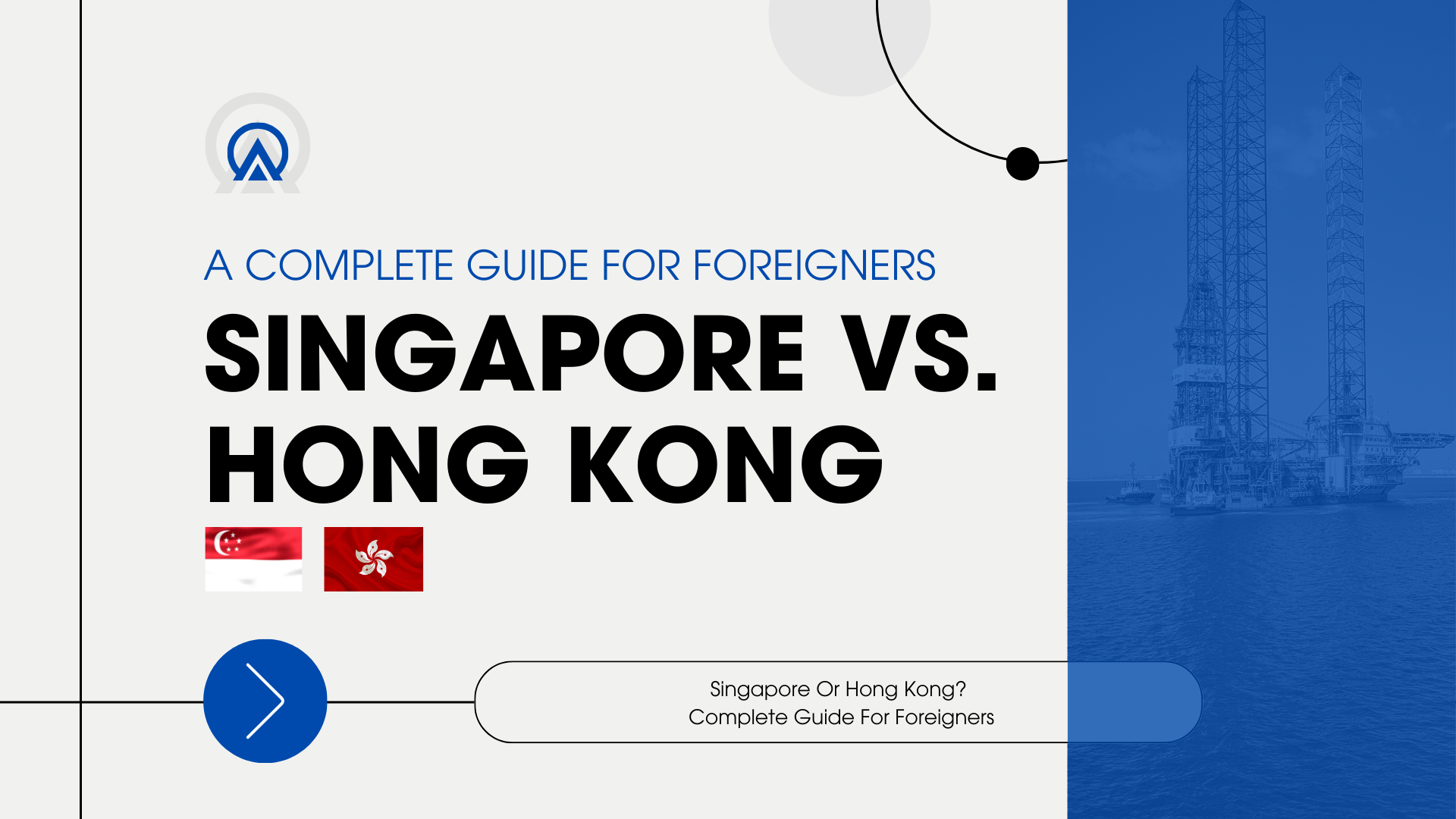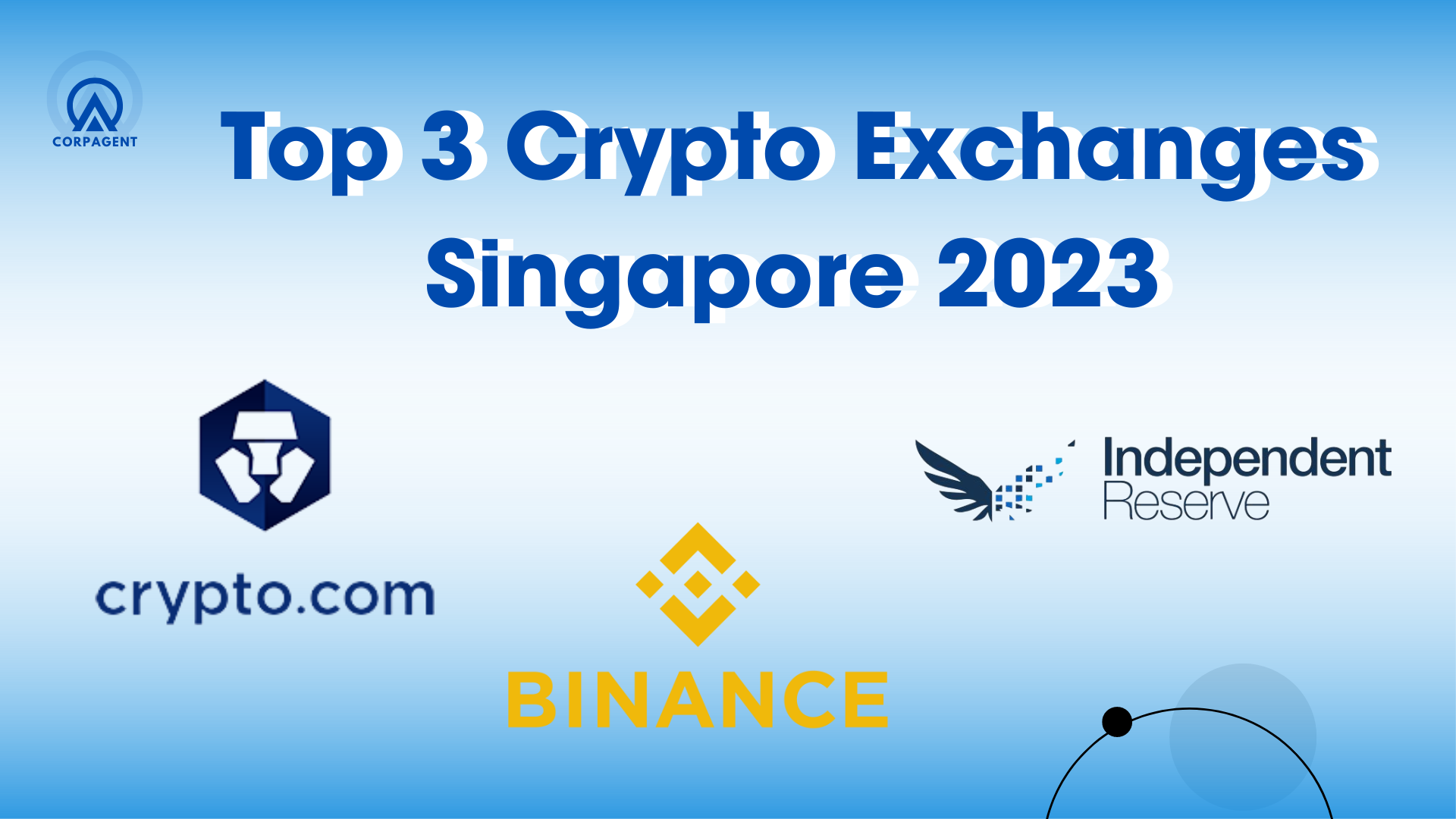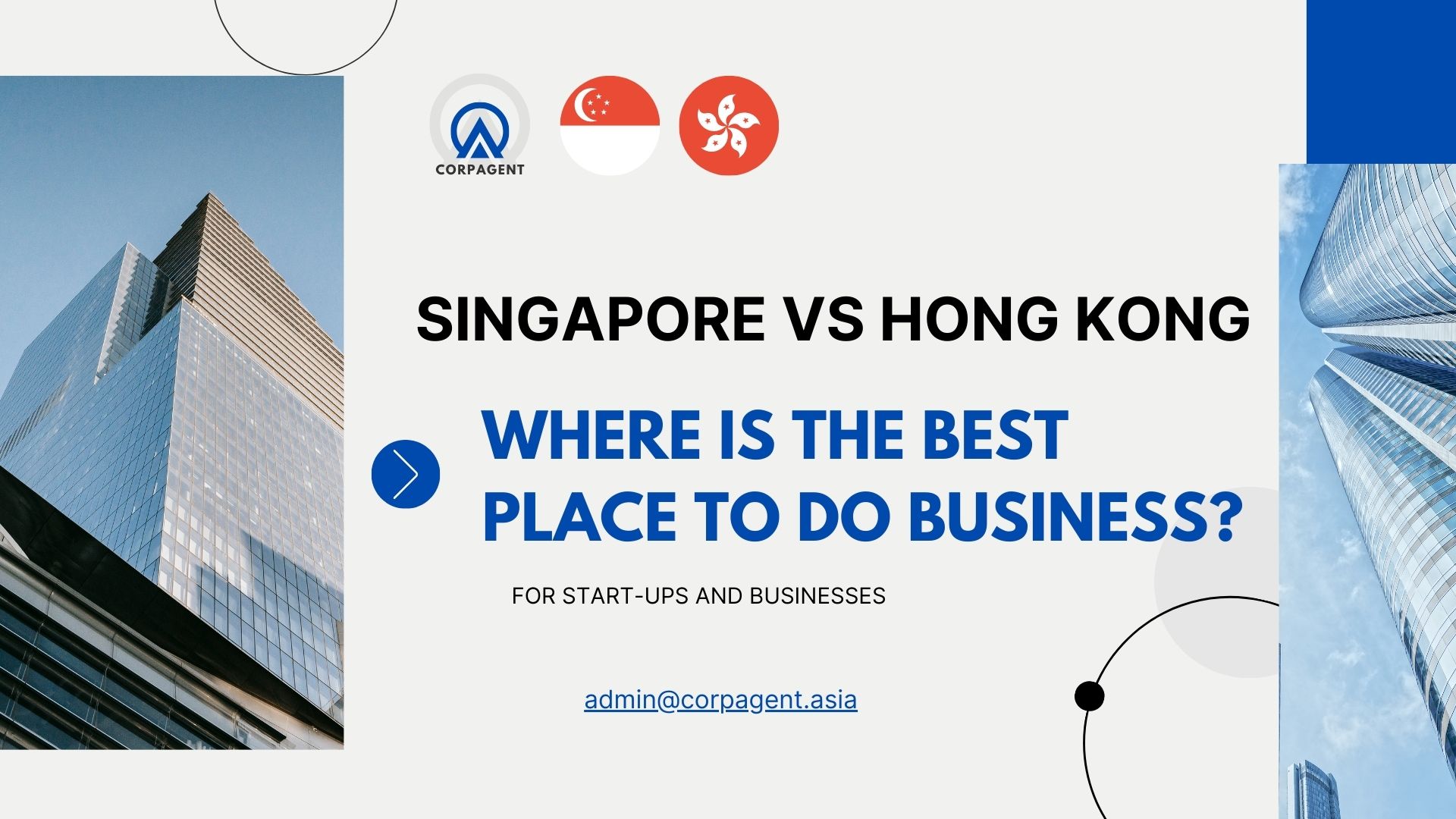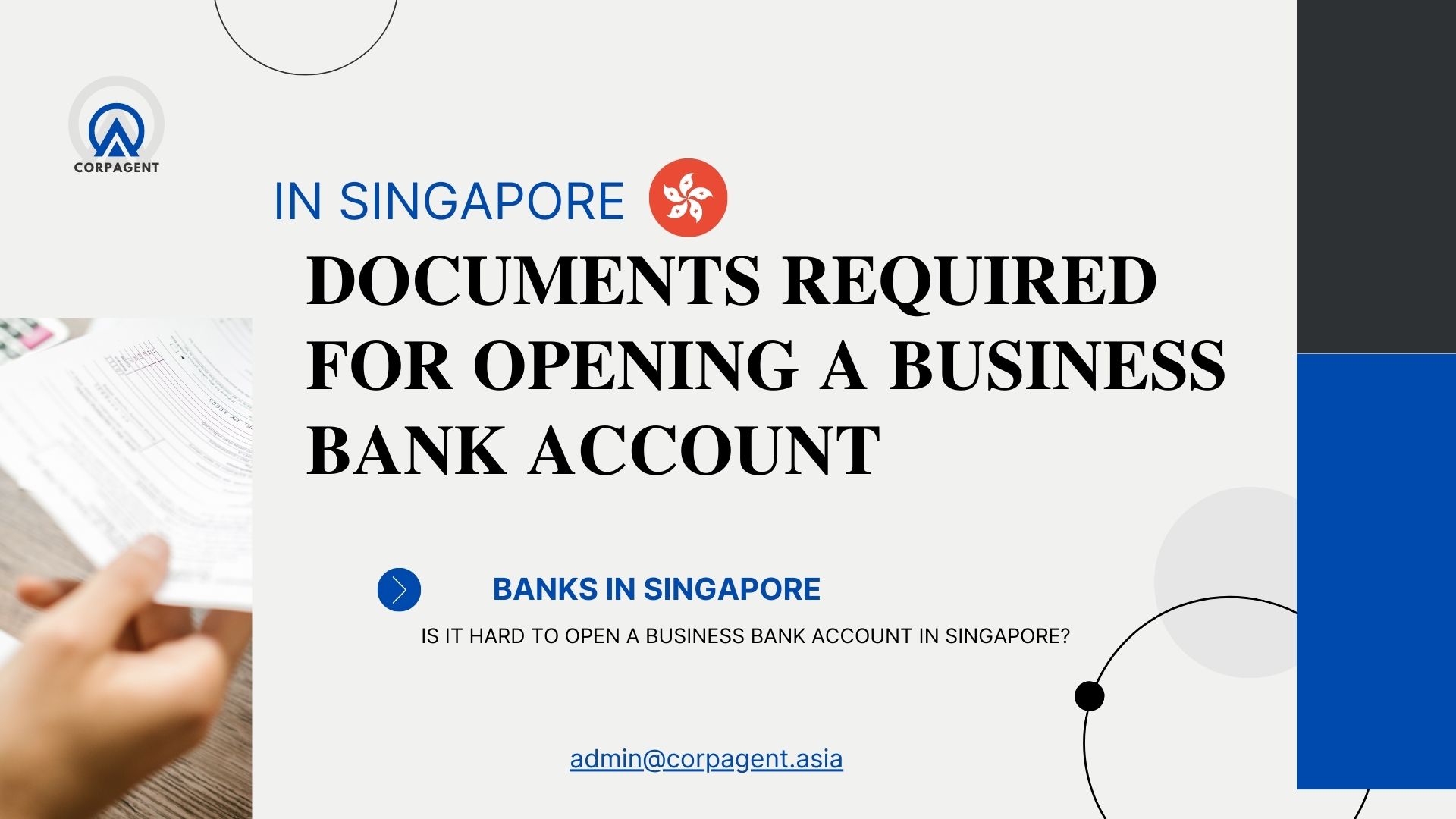Singapore Or Hong Kong? Complete Guide For Foreigners (2023)
15-11-2022

Doing Business – Singapore vs Hong Kong
Singapore and Hong Kong have been competing for decades to gain dominance as Asia’s ‘Best Place to Do Business’. Both the regions have been luring foreign investors with their tax friendly policies, easy company incorporation procedures and excellent infrastructure, amongst several other factors. Hong Kong has a longer history as a centre for business but Singapore has fast caught up undermining Hong Kong’s dominance in the region. Singapore has been quick and nimble to adopt business friendly policies that continue to attract bulk of the foreign investors to establish their Asian presence on its shores.
There is no clear cut and definitive black-and-white answer to the question of which jurisdiction is currently more attractive. It is a highly competitive landscape and some investors choose Singapore, driven by lifestyle reasons or by the strength of infrastructure and the quality of service providers. Some choose Hong Kong mainly to tap into the greater Chinese and North Asian markets. Smaller businesses often choose Singapore as it offers more attractive tax benefits and lower cost environment when compared to its rival.
This article examines the advantages and challenges of setting up business operations in the two jurisdictions namely Singapore and Hong Kong, taking into consideration factors like location, political climate, economic environment, legal landscape, taxation policies, workforce productivity, quality of life, infrastructure set-up and the overall ease of doing business.
Location
- Both Singapore and Hong Kong are strategically located at the heart of the Asian continent, with most Asian countries accessible within a five to seven hours flight radius. However, if you need to tap into the Mainland Chinese market you will find that Hong Kong is perfectly situated on the southeast coast of Mainland China, flanking the mouth of the Pearl River Delta. With Hong Kong as your base, you can travel back and forth to Beijing, Shanghai and other major Chinese cities in a single day.
- Singapore’s Changi Airport and The Hong Kong International Airport are considered the best in the world and provide you easy access to major cities in the Asia Pacific, North America, Europe and the Middle East. Singapore is also home to the busiest port in the world and having the most extensive international port connections makes Singapore the top docking destination for trade. On the other hand, Hong Kong is confined to being a focal point of all maritime activities in southern China. In recent years Singapore has surpassed Hong Kong as the world’s busiest container port.
Ease of doing business
- Singapore and Hong Kong are renowned for being easy places to set up businesses. You may open your company in approximately three working days in both Singapore and Hong Kong. Infrastructure facilities such as business premises are easily available. There are strict regulations regarding intellectual property protection and various dispute resolution channels are available. The simple and business friendly tax system draws foreign investors to both the countries. An open immigration policy with appropriate work visa provisions facilitates the relocation of foreigners who wish to set up business in Singapore or Hong Kong.
- Both the countries often vie with each other in rankings regarding the ease of doing business. In this regard Singapore stands out overall and is ranked as the best place in the world to do business in the World Bank’s “Doing Business 2015” report. In both economies, it takes only 3 procedures and 1-3 days to incorporate a business. However, Singapore fares much better when it comes to enforcing contracts (1 vs. HK’s 22) and registering a property (17 vs. HK’s 59). Compared to the Asian region’s 7 procedures and 38 days, it is no surprise that Singapore and Hong Kong are ranked highly.
| Ranking Category | Singapore’s Ranking | Hong Kong’s Ranking | Source |
|---|---|---|---|
| World’s easiest place to do business |
1 |
5 |
World Bank Report: Doing business 2015 |
| Most Competitive Economy |
2 |
7 |
World Economic Forum’s Global Competitiveness Report 2015–2016 |
| Ease of Paying Taxes |
4 |
3 |
PWC Paying Taxes 2011 |
| Openness to Trade |
1 |
2 |
World Economic Forum’s Global Enabling Trade Index 2010 |
| Most Competitive Economy |
3 |
2 |
2015 IMD, World Competitiveness Yearbook |
| World’s Freest Economy |
2 |
1 |
Heritage Foundation’s Index of Economic Freedom |
Quality of Life
- While Singapore and Hong Kong score more or less the same on most of the parameters, Singapore really edges out in the quality of life factor. Singapore is considered an easier place to adapt to when relocating from elsewhere. The social and ethnic fabric is a unique blend of cultures and people rendering a cosmopolitan lifestyle. The city is considered modern and westernised and English is widely spoken on the island. Hong Kong’s population however is predominantly Chinese and Mandarin or Cantonese continue to remain the common language of communication.
- Expatriates continue to cite safety as one of the most attractive features of living in Singapore and it records the lowest crime rates in the world. According to a survey by Mercer Human Resource Consulting, 2010, Singapore tops the Asia-Pacific list of cities for ‘Quality of Living’.
- Singapore’s population enjoys one of the highest levels of health and nutrition in Asia. Singapore promotes a clean, green and healthy environment, free from traffic congestion. According to the National Environment Agency, air quality in terms of Pollutant Standard Index (PSI) was good on 93% of the days in 2010 and moderate on 7% of the days. Hong Kong on the other hand experiences a high level of air pollution and traffic congestion. Executives have been relocating to Singapore because the air pollution is either causing health problems for them or for their families.
- When it comes to food, Singapore follows urban living standards of both east and west. Hong Kong is commonly cited as the food capital of China and every Chinese regional cuisine is celebrated here. Eating out is a common activity in Singapore and is considered pocket-friendly when compared to its rival Hong Kong.
- Singapore offers expatriates a wide variety of accommodation options to cater to all types of needs, preferences and budgets. Rentals are still considered affordable when compared to other major developed cities. In Hong Kong you will find that residential rentals are much more expensive than in Singapore and are considered in line with those in major international cities such as London and New York.
- A common encumbrance cited by some expatriates is that the cost of living is much higher in Singapore when compared to Hong Kong. However, many of them still prefer Singapore for the opportunities it offers.
- Although Singapore and Hong Kong have both established world-class health facilities, excellent infrastructure, efficient transport systems and international schools/universities to cater to the expatriate community, Hong Kong expats earn less than Singapore expats, according to a 2011 report by ECA International, a company that researches living conditions in the world’s top cities for corporations. It is now in a category where businesses should think about paying more allowances to employees.
To find out more about quality of life in Singapore, please refer to Quality of Life in Singapore.
| Ranking Category | Singapore’s Ranking | Hong Kong’s Ranking | Source |
|---|---|---|---|
| Cost of Living |
8 |
9 |
Mercer Human Resource Consulting, 2011 |
| Best Quality of Living in the world |
28 |
71 |
Mercer Human Resource Consulting, 2010 |
| Best Asian City for Expatriate Pay |
5 |
10 |
ECA International Expatriate Market Pay Survey 2011 |
Taxation
- Taxes are on top of the agenda for any entrepreneur and one of the key considerations for setting up a business in a given jurisdiction. One of Singapore’s unique advantages is its low effective personal and corporate tax rates. Personal income tax follows a tiered system in both regions. In Singapore, the personal income tax rate starts from 3.5% and goes up to 20% for income above SGD 320,000. In Hong Kong, personal income tax, or salary tax as it is known, starts at 2% and goes up to 17% for income above HKD 120,000. However, Singapore’s net effective personal income tax rate is much lower than that of Hong Kong’s. For example, a person earning USD 65,000 in Hong Kong would end up paying close to USD 6,500 as personal income tax. Whereas in Singapore, he would only have to pay approximately USD 4,000.
- Singapore’s headline corporate tax rate is a flat 17% at present. In Hong Kong, corporate tax, (or profits tax as it is known), is set at 16.5% of assessable profits for corporations and 15% for unincorporated businesses. In order to make Singapore an attractive investment destination, corporate tax rates in Singapore have been going down consistently. Effective YA 2011 corporate income tax rate are reduced from 18% to 17% to help maintain Singapore’s competitiveness.
- Characteristically, headline company tax rate in Singapore as in many other jurisdictions does not necessarily provide an accurate indication of effective corporate tax rate. The effective rate is normally lower than the headline tax rate due to applicable tax exemptions and tax incentives, depreciation rules, etc. Once these tax exemptions are applied to the taxable income, the effective tax rates for small-to-mid size Singapore companies is reduced significantly when compared to the corporate tax rate payable in Hong Kong. Effective corporate tax rate for Singapore private limited companies for profits up to SGD 300,000 is capped at 17% for profits above SGD 300,000. However, newly-setup Singapore incorporated start-ups enjoy full tax exemption on the first S$100,000 in profits earned for 3 consecutive years and 50% off the next S$200,000. With effect of 2010, the government has updated its partial and full-tax exemption schemes for start-ups as well, allowing start-ups to enjoy either Corporate Income Tax (CIT) rebates or SME cash grants.
- In addition, the Singapore government has also introduced many industry-specific tax incentives to encourage foreign investment and growth of the targeted industries in Singapore. This tax structure allows SMEs to flourish and encourages entrepreneurs to set up operations here. For more information on taxation in Singapore, refer to our Singapore Tax section. To compare taxes between Singapore and Hong Kong, use this online tax calculator.
See CorpAgent’s Singapore Company Formation Package
See CorpAgent’s Hong Kong Company Formation Package
Workforce Quality
- Both Singapore and Hong Kong sport a highly-trained, well-educated and skilled wok-force. Hong Kong boasts of a local pool of experienced and entrepreneurial talent with an appreciation of the business culture in the fast-growing Mainland cities. Although English is the language of communication in business settings, a bulk of the workforce is more comfortable conversing in Cantonese and Mandarin, owing to the country’s link to China. Singapore on the other hand, has an unrivalled edge over Hong Kong regarding its cosmopolitan, professionally qualified, highly educated, largely English speaking and technically proficient workforce. Being a knowledge-based economy and an international hub across various platforms the country attracts the best foreign talent in the industry.
- Moreover, employment costs are considered higher in Hong Kong than others in Southeast Asia. Thus, many businesses prefer to set up operations in Singapore as they are assured of an English speaking workforce at affordable costs.
| Ranking Category | Singapore Ranking | Hong Kong Ranking | Source |
|---|---|---|---|
| Most Competitive Economy |
3 |
2 |
IMD World Competitiveness Yearbook, 2015 |
| Reliance on professional management |
5 |
23 |
World Economic Forum’s Global Competitiveness Report 2015–2016 |
| Cooperation in labor-employer relations |
3 |
12 |
World Economic Forum’s Global Competitiveness Report 2015–2016 |
| Pay and productivity |
3 |
2 |
World Economic Forum’s Global Competitiveness Report 2015–2016 |
Political Climate
- Singapore has been ranked as the 2nd most politically stable country in Asia, followed by Hongkong, by the Political and Economic Risk Consultancy in 2010. Singapore’s stable and pro-business political climate has boosted its credibility as an international center to do business, with increasing number of companies choosing to set up operations here. Transparency, high levels of integrity, strict law enforcement, control of corruption, market-friendly policy formulation and sound policy implementation have become the hallmark of the Singapore Government. To learn more about Singapore’s political environment, see Political System in Singapore.
- Hong Kong is a Special Administrative Region of the People’s Republic of China with a high degree of autonomy in all matters except foreign and defense affairs. According to the Sino-British Joint Declaration (1984) and the Basic Law, Hong Kong retains its political, economic, and judicial systems. This setup is often referred to as “One China, Two Systems”. The city’s appeal is built on its political stability, pro-business governance and free market principles. It is also cited as one of the most corruption-free economies in the world.
| Ranking Category | Singapore Ranking | Hong Kong Ranking | Source |
|---|---|---|---|
| Most Politically stable country in Asia |
2 |
3 | Political & Economic Risk Consultancy, Asian Risk Prospects 2010 |
| Nation with the Highest Public Trust of Politicians |
1 |
19 | World Economic Forum’s Global Competitiveness Report 2015–2016 |
| Transparency of government policymaking |
1 |
3 | World Economic Forum’s Global Competitiveness Report 2015–2016 |
| Burden of government regulation |
1 |
3 |
World Economic Forum’s Global Competitiveness Report 2015–2016 |
| Wastefulness of government spending |
3 |
14 |
World Economic Forum’s Global Competitiveness Report 2015–2016 |
Economic Landscape
- With strong trade and investment, Singapore has positioned itself as the the most competitive Asian country. The economy is driven by exports in electronics manufacturing and machinery, with financial services and tourism as other key sectors. Singapore has twice the GDP per capita of Thailand, Malaysia, Indonesia, and the Philippines – combined. Singapore’s GDP is grew by 14.5% in 2010 while the annual inflation rate remains low at 2.1%. Zero foreign debt, high government revenue and a consistent positive surplus are its major economic strengths. Additionally, Singapore is the fourth largest foreign exchange trading center in the world. To find out more about Singapore’s economic environment, please refer to Economy in Singapore.
- Hong Kong is one of the world’s most dynamic economies driven by the principles of free enterprise, free trade and free markets open to all. The robust economy over the past two decades has contributed to the GDP growth at an average annual rate of 5% in real terms. There are no restrictions on inward and outward investments, no foreign exchange controls and no foreign ownership restrictions. Hong Kong’s economic strengths include a sound banking system, virtually no public debt, a strong legal system, ample foreign exchange reserves and an able and rigorously enforced anti-corruption regime.
| Ranking Category | Singapore Ranking | Hong Kong Ranking | Source |
|---|---|---|---|
| World’s Most Competitive Economy |
3 |
2 |
IMD World Competitiveness Yearbook, 2015 |
| World’s Freest Economy |
2 |
1 |
The Heritage Foundation, Index of Economic Freedom, 2016 |
Legal Environment
- Singapore’s efficient and reliable legal system has made it a popular destination for investors to set up business operations here. There are clear-cut regulations pertaining to intellectual property, manpower, wages, immigration, e-commerce, piracy etc. Foreigners can largely expect an impartial trial from the country’s judicial system, especially in matters related to business. There are a number of dispute resolution channels available, to help businesses settle disputes in a speedy and cost-effective manner. To find out more about Singapore’s legal system, please refer to Legal System in Singapore.
- The rule of law is fundamental to Hong Kong’s success. All are equal before the law. Hong Kong’s legal system is separate from Mainland China’s, and English common law prevails. Like Singapore, Hong Kong has developed into one of the world’s major arbitration jurisdictions since establishing its International Arbitration Centre in 1985. Both Singapore and Hong Kong have the lowest crime rates in the world and are safe cities to live in.
- Both Singapore and Hong Kong have been taking measures to upgrade their infrastructure in order to meet the growing demands of businesses. Both regions have the Best Airports and Busiest Ports in the world. Transportation services are efficient and cheap connecting all major centres in the respective regions. Both Singapore and Hong Kong are vying with each other to become the preferred Exhibition and Convention Centre. Furthermore, each region has seen the growth of sizable industrial and business parks.
- Hong Kong’s and Singapore’s telecommunications infrastructure is one of the most technically advanced in the world. Broadband coverage is available to virtually all commercial and residential buildings. Hong Kong’s open markets ensures there are several competitive mobile phone and Internet service providers. Broadband Internet connection is available to over 98% of households in Hong Kong and to 99.9% of households in Singapore.
| Ranking Category | Singapore’s Ranking | Hong Kong’s Ranking | Source |
|---|---|---|---|
| World’s Most ‘Network Ready’ country |
1 |
14 |
World Economic Forum’s Global Information Technology Report 2015 |
|
Infrastructure and Digital Content
|
19 |
28 |
World Economic Forum’s Global Information Technology Report 2015
|
| Gov’t success in ICT promotion |
3 |
30 |
World Economic Forum’s Global Information Technology Report 2015/td> |
| ICT use & gov’t efficiency |
2 |
24 |
World Economic Forum’s Global Information Technology Report 2015 |
| Best Quality for Port and Air Transport Infrastructure |
2, 1 |
5, 3 |
World Economic Forum’s Global Competitiveness Report 2015–2016 |
| Best Quality of Overall Infrastructure |
2 |
1 |
World Economic Forum’s Global Competitiveness Report 2015–2016 |
Final Thoughts
Given Singapore’s emergence as a strong rival for international business, Hong Kong is no longer the only place in the Asian region to do business. Additionally, Hong Kong is no longer as attractive as it used to be – it scores low on quality of life and high on cost of living, qualified labour at affordable costs is no longer as easily available, English usage is declining and the business community has concerns over the region’s political stability in the future. Singapore being Hong Kong’s most immediate competitor has addressed all these concerns and is even offering generous tax incentives to woo investors. Singapore surpasses Hong Kong in most surveys and is soon becoming the preferred international business destination.
Other News
Singapore VS Hong Kong : Where is the best place to do business 2023?
Singapore and Hong Kong have been vying for dominance as Asia’s ‘Best Place to Do Business’ for decades. Both regions have enticed international investors with tax-friendly regulations, simple firm incorporation procedures, and superb infrastructure, among other things. Although Hong Kong has a longer history as a corporate center, Singapore has quickly caught up, eroding Hong Kong’s supremacy in the area. Singapore has been fast to implement business-friendly regulations that have attracted the majority of global companies to build their Asian presence on its shores.
What documents are required for opening a business bank account in Singapore 2023?
When you’re ready to start taking or spending money as your business, open a business account. A business bank account keeps you legally compliant and safe. It also has advantages for your customers and workers.
Today, we’ll look at Singapore’s banking business, which is a sophisticated financial ecosystem of local and foreign institutions. You will learn about the procedures for creating a corporate bank account, the required documentation, and the variety of banking services. And if you’re interested in opening a business bank account in Singpore, we’ll provide you with consultancy to help you, please contact us through https://corpagent.asia/
RISKS & TIPS FOR OPENING A BANK ACCOUNT FOR START-UPS IN HONG KONG
The difficulty of obtaining commercial bank accounts in Hong Kong has been well – recognized in recent years. It is also really complicated. Despite media attention and pressure from the Hong Kong Monetary Authority, InvestHK, Chambers of Commerce, and Hong Kong business organizations, opening bank accounts remains difficult for start-ups and small and medium-sized firms in particular.

Top 3 Crypto Exchanges Singapore 2023
Singapore is a prominent financial center that has experienced an increase in cryptocurrency use. Investors are seeking for the finest crypto exchange in Singapore, with up to 93% of its population having moderate knowledge of the crypto business.
This article will guide you some newest and safest pros and cons, provided base on top reviewers of top 3 crypto exchanges in Singapore:







